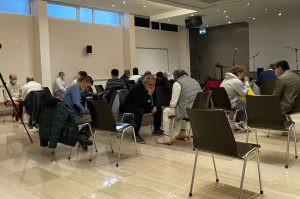Mental pain is less dramatic than physical pain, but it is more common and also more hard to bear. The frequent attempt to conceal mental pain increases the burden: it is easier to say ‘My tooth is aching’ than to say ‘My heart is broken.’
CS Lewis
A while ago, a wife whose husband was deep into porn set up a one-hour call with me, wanting my input on her situation. She called in, and I listened… for 55 minutes straight. I didn’t say a word the entire time. With several minutes to go, I said, “I’d like this call to be a benefit to you; is there a question you’d like to ask me?”
After we ended the call it hit me that the call had been a blessing to her; having someone safe to talk to who could relate to what she was going through was a big deal to her. There are times when I’m talking with people and sense they’re starved for friendship, and I’ve momentarily stepped into that role. Sometimes the most powerful thing we can do is show up, be a safe person, and listen.
We hear “I have no one to talk to” often from Christians who call us for help, including pastors. I’ve had pastors tell me they’ve shared their complete story for the first time in their life. When I speak, I’ll sometimes ask the audience to raise their hands if they meet with another believer once a week for the purpose of support, accountability, and prayer. Usually only 15% raise their hands.
Loneliness is a serious problem with harmful consequences. Social isolation is linked to a 50% increased of dementia, a 29% increased risk of heart disease, and a 32% increased risk of stroke. Loneliness shoots depression through the roof. One study of persons 50 and older found that a one-point increase on their loneliness scale was related to a 16% increase in the severity of depressive symptoms. Another study on loneliness likened isolation’s effects to the health risks on the body to the equivalent of smoking 15 cigarettes a day.
And, isolation feeds porn addiction and a host of other sins such as overeating. After Covid broke early 2020 our requests for help shot through the roof, exposing the need of many in the church for connection. Every believer who is ensnared to sexual sin is isolated
What’s going on here? With all our seminaries and Bible colleges, why has the church failed in this fundamental area of the Christian life? We know the early church was devoted to fellowship, why haven’t we followed their example?
Our culture exalts the strong individual, those make things happen. We live like hamsters, constantly running to the next thing. (Or are we just spinning our wheels?) When Americans ask “How are you?” they don’t really want more than “I’m fine” in return. Too busy for that. Life in the suburbs puts us to sleep; all it takes is a TV or a smartphone to zone out with. Who needs connection with others?
Our churches train us in the art of isolation.
Sunday morning at church, we’re told to “turn around and greet the person next to you.” Everyone suddenly goes Pollyanna and says, “Hi, how are you?” with a bright and cheery smile. “I’m great!” Pollyanna clone #2 says. Awkward pause. Both sides look away and repeat the cycle with someone else, until the pastor relieves every one of their misery and starts the message.
What a joke. That’s not a church devoted to fellowship, it’s more like a bunch of posers pretending they got it all together.
There are a number of other social and other factors that contribute to isolation, but I’ll hit this one: Pride. I can do life on my own. I don’t need other people in my life. I go to church, pray and read my Bible. Isn’t that enough?
Whoever isolates himself seeks his own desire;
he breaks out against all sound judgment.
Proverbs 18:1
Those who are isolated are self-absorbed (seeking your own desire). Breaking out against all sound judgment is Bible-speak for saying you’ve lost it if you think you can live life that way.
Therefore, confess your sins to one another and pray for one another, that you may be healed.
James 5:16
Confessing our sins to others isn’t optional. I’ve heard believers make excuses when it comes to James 5:16 “I’ve confessed it to God and He’s forgiven me, isn’t that enough?” Umm, no, not according to Scripture. Forgiveness and healing are two different issues. In the end, don’t we avoid confessing our sins to others because of pride?
Sure, the church isn’t always a safe place to share, but that doesn’t mean we give up. We ask God for a safe believer to talk to, and we keep going.
This is why, when I speak at church or lead retreats or conferences I’ll have the audience break up into small groups of two and share and pray for each other:

We must lead God’s people out of the cave of isolation. Preaching a sermon and sending everyone home isn’t going to get it done. Do you realize the effect it would have on the body of Christ if we broke everyone up to share and pray every Sunday? We would take a huge step toward eradicating loneliness in the church and many would receive healing and help in the areas they’re struggling in.
Pastors, you must lead! Shorten your sermons to 20 minutes and give your people 20-25 minutes to share and pray. Create a Rogue Church that is devoted to teaching, fellowship, and prayer. Don’t just talk about it, do it!
If you’re isolated and reading this, you’re making a big mistake. You’re putting your mental and physical health at risk, you’re living the Christian life in your flesh, and you’re more prone to falling into sin than those who are connected to other believers.
Ask God for another believer or group to meet with, or at least, join one of our eight prayer groups. There’s no cost to join. Reply to this email to get plugged in. Every one of you should meet with another believer or group weekly for the purpose of support, accountability, and prayer.
I will leave you with this. Being connected to other believers isn’t just about you. It’s about ministering to others in the body of Christ who need a friend just as much as you do.

